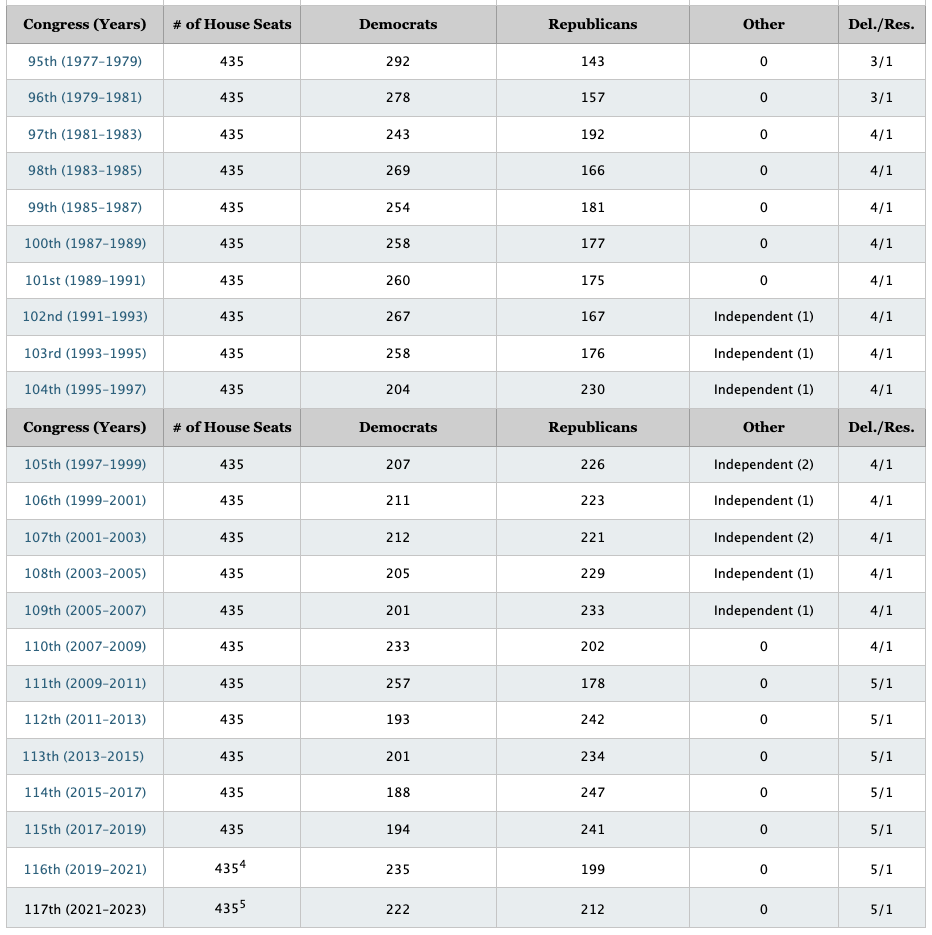Marginal Differences Magnify Individual Races
We used to (usually) know the results on Election Night because the outcomes were clearer.

While I continue to believe states need to improve their vote-counting mechanisms to account for the increased reliance on mail-in voting (or move to drop boxes or some other alternative measure to get all ballots in by Election Day so they can be counted more expeditiously) my friend and co-blogger Steven Taylor makes an important point in a comment thread:
I really do think, and we can set 2000 aside, that the notion that we always knew on Election Day is overblown. What has changed is that specific seats were not this important. It has always taken a few days to know the final House count, for example. It is just that most people don’t pay attention to that because they don’t care exactly how many seats a party wins, just who the majority is.
The reason we remember the 2022 Georgia run-off elections that decided the fate of the Senate and the 2000 court battles between George W. Bush and Al Gore to determine the fate of Florida’s Electoral College votes so well is because they’re so unusual.
Here’s the party breakdown of the US House of Representatives from 1977 to 2023*

As you can see, in most cycles there was simply no reason to pay attention to marginal races that may have been decided late. The ongoing counting for the 118th Congress (not shown here, obviously) is the first time since the 72nd Congress of 1931-33 (not shown; the margin was 216 Democrats to 218 Republicans) that the balance was close and that predates television coverage of elections by a good bit. **
The Senate’s sister page, for whatever reason, does not provide a neat chart but here’s my own:
| Congress | Democrats | Republicans |
| 95th (1977-79) | 61 | 38 |
| 96th (1979-81) | 58 | 41 |
| 97th (1981-83) | 46 | 53 |
| 98th (1983-85) | 45 | 55 |
| 99th (1985-87) | 47 | 53 |
| 100th (1987-89) | 55 | 45 |
| 101st (1989-91) | 55 | 45 |
| 102nd (1991-93) | 56 | 44 |
| 103rd (1993-95) | 57 | 43 |
| 104th (1995-97) | 48 | 52 |
| 105th (1997-99) | 45 | 55 |
| 106th (1999-2001) | 45 | 55 |
| 107th (2001-03) | Jan 3-20 50 (Dem control) Jan 20-Jun 6 50 Jun 6, 2001-Nov 12, 2002 50+1 (Dem control) Nov 12, 2002-Jan 3, 2003 48 + 1 | Jan 3-20 50 Jan 20-Jun 6 50 (GOP control) Jun 6, 2001-Nov 12, 2002 49 Nov 12, 2002-Jan 3, 2003 50 (GOP control) |
| 108th (2003-05) | 48+1 | 51 |
| 109th (2005-07) | 44+1 | 55 |
| 110th (2007-09) | 49+2 | 49 |
| 111th (2009-11) | 59 | 41 |
| 112th (2011-13) | 51 | 47 |
| 113th (2013-15) | 53 | 45 |
| 114th (2015-17) | 44 | 54 |
| 115th (2017-19) | 47 | 51 |
| 116th (2019-21) | 45 | 53 |
| 117th (2021-23) | 48+2 (Dem control) | 50 |
We all remember that bizarre period in the 107th Congress, with constant party turnover due to death and defection, quite well. And that had nothing to do with slow counting. And, again, we remember the twin runoffs in Georgia last year, since they were for all the marbles.
Add in the fact that, until very recently, the parties were much less polarized and thus more amenable to compromise, and the stakes were simply lower.
__________________
*I chose this range because it’s what fit neatly on my computer screen but it roughly coincides with my own interest in such things.
**Even more oddly, according to a footnote regarding that Congress, “Before the first day of Congress, 14 Representatives-elect died. The results of the special elections caused party control of the House to change, and Democrats organized with the majority of the House seats.” I have no idea what the cause of that was but it’s tangential to our discussion here.
Ultimately, my push-back is mostly on impatience about processes that have always been slower than perceived.
And we fully agree that states like AZ and NV need to improve their processes and I whole-heartedly agree that speeding up the results would be better since slowness does help foster the thoughts of the conspiracy-minded (although too much speed can do the same with such folks!).
I just wish (vainly, I know) that politicians would not stoke their flames (most especially Trump, but Marco Rubio as well who has made comments about slowness, mostly as a side-boast about Florida, but still).
@Steven L. Taylor:
Other western states are comparably slow, it’s just more noticeable AZ/NV this time because of the close Senate/Governor races in those states. CA, the biggy, is way slower, still lots of uncalled Congressional races in CA. It’s tied to mostly mail-in voting.
@charon:
I’ll add to @charon that vote by mail in the West was adopted to a considerable degree because explosive population growth rendered the old “precinct” model obsolete. Every election cycle election officials had to find more polling places. Every election cycle they had to find more volunteers to staff those. Because they couldn’t keep up — particularly on staffing — every election cycle they needed bigger polling places. So every election cycle there was a high probability your precinct polling place would be different and farther away. The other day I mentioned voter suppression by inconvenience. That’s what was happening.
The immediate reaction was permanent no-excuse mail ballot lists. Which turned out to be so popular that eventually it didn’t make sense to run two full-on systems in parallel. Unsurprisingly, lawmakers chose to keep the popular one and reduce the other one to a minimum. Note that in Oregon they eliminated the precinct system entirely. I believe it’s changed, but at one point the only way to vote in Oregon was by mail.
Ummmm… I don’t remember the 2022 Georgia run offs… And while I do drink more than I should, I suspect in this case it is because the 2022 Georgia run-off election has yet to happen.
😉 😉 😉
Sorry James, I couldn’t resist.